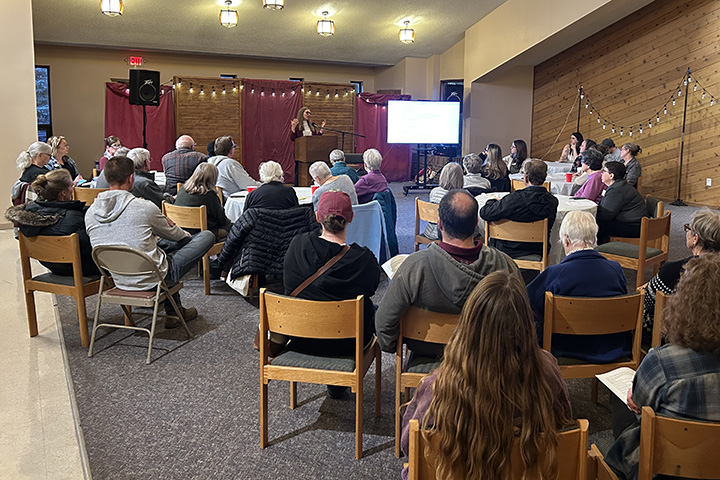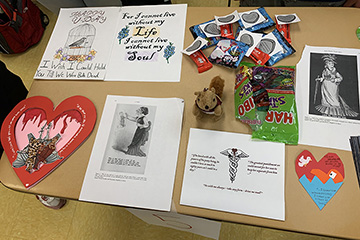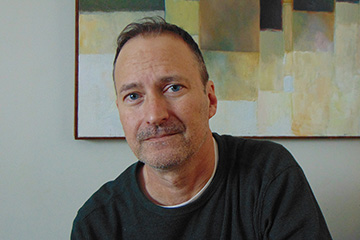CMU Social Work Program leads hunger response effort
A call to campus and community action
As food insecurity continues to rise across Isabella County, Central Michigan University’s Social Work Program is stepping forward with a clear message: hunger is not just a community issue—it’s a campus issue, too. Through collaborative teaching, student engagement, and partnerships with local agencies, CMU social work faculty and students are leading efforts to strengthen food access, raise awareness, and support local families affected by the recent pause in SNAP benefits.
Recent data from the Michigan Health Improvement Alliance show that nearly one in six residents in Isabella County faces food insecurity, with child food insecurity approaching 20 percent. The ongoing disruptions in SNAP benefit distribution have placed additional strain on local pantries and community meal programs—prompting an urgent call for university engagement.
“As a local community member, CMU alumna, and social worker, I feel that we have an opportunity to serve the community that our students are part of—whether short- or long-term—and build connection through it,” said Valerie K. Austin, Ed.D., LMSW, faculty member in the Social Work Program. “This initiative is about using our collective resources to make a tangible difference right here in Mount Pleasant. No matter which department you belong to or what subject you teach, there’s a place for all of us to get involved.”
Faculty and student-led service and partnerships
Social Work Program Director Lissa Schwander and Austin recently helped convene a community collaborative meeting bringing together university representatives, agency partners, and local organizations to address food insecurity and related community needs. What began as a small planning session quickly grew into a gathering of more than 50 participants—faculty, nonprofit leaders, and community members—sharing ideas, expertise, and a shared commitment to helping neighbors in need.
“I was impressed and inspired by the number of people who attended the meeting on such short notice—and equally impressed by the range of agencies and institutions represented,” said Schwander. “It’s a testament to the kind of caring community we have here in Isabella County.”

Building on this momentum, the CMU Social Work Program launched “What’s for Dinner?”, a campus-wide food donation and meal kit initiative to provide short-term relief to local families. As households face rising costs and temporary interruptions in SNAP benefits, CMU faculty, staff, and students are coming together to assemble and distribute hundreds of meal kits through partnerships with the Community Compassion Network (CCN), Isabella Community Soup Kitchen (ICSK), and other local pantries.
An additional opportunity is in development to mobilize students and volunteers for on-site food collection drives at local stores—an effort that will require further coordination. Those interested in helping are encouraged to reach out to join the planning team.
Volunteer with a faculty member
The initiative extends beyond donation drives—it’s also a teaching opportunity. Through the new Volunteer with a Faculty Member program and group Volunteer Takeover Events, professors and students serve side by side in pantries, soup kitchens, and distribution sites. These shared experiences strengthen faculty-student relationships while transforming classroom lessons into real-world service.
Faculty are encouraged to commit to a volunteer shift and invite their students to join them. Registered student organizations, campus groups, and athletic teams are also invited to participate by hosting a volunteer “takeover” at a local food pantry or soup kitchen. Students can even nominate their favorite professors to join the effort.
Social work courses have integrated service-learning modules that ask students to assess community needs, collaborate with local agencies, and apply professional skills in outreach, advocacy, and policy awareness.
“We’re helping students connect what they learn about social systems to what they can do about them, and this can happen in ways that extend well beyond classrooms,” Austin explained.
Campus-wide call to action
The effort is expanding beyond social work. Faculty across disciplines—health, education, business, arts, and technology—are encouraged to participate through course projects, volunteer teams, and departmental service drives.
University departments and organizations can:
- Sign up for a meal kit donation as a department or host collection bins for food and hygiene items.
- Partner with local agencies for volunteer days.
- Integrate hunger awareness and community engagement into class projects, internships, or research.
Campus and community partners are also invited to attend the next Hunger Response Community Collaborative Meeting on November 13, 12:00–1:00 PM, at Immanuel Lutheran Church (320 S. Bradley, Mount Pleasant).
Upcoming engagement opportunities
Faculty, departments, and student organizations interested in participating can contact Austin at austi1vk@cmich.edu for guidance and sign-up information.
- Volunteer Drive: November 10–26 – Sign up for a shift at Community Compassion Network or the Isabella Community Soup Kitchen.
- Meal Kit Donation Drive & Assembly: November 3–22
- Community Distribution Day: November 24
By combining the energy of students, the expertise of faculty, and the generosity of the broader community, CMU’s Social Work Program hopes to model what effective university–community partnership looks like in action.
Austin reflected, “When we show up for our neighbors, we show that CMU doesn’t just talk about community—we do it.”




